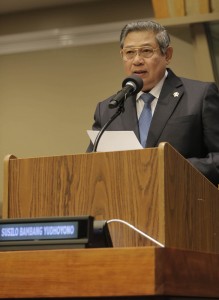Jakarta, Ekuatorial – President Susilo Bambang Yudhoyono stated that Indonesia’s forest conservation project, or mostly known as REDD+, has proven to be a valuable modality in the efforts to address deforestation and forest degradation.
The statement was delivered at the Indonesia’s REDD+ Forum on Wednesday (24/9) in conjunction with the 69th session of the United Nations (UN) General Assembly, which opened on September 16 and will end on September 30, held in the UN Headquarters, New York.
On his speech, President Yudhoyono shared lesson learned from REDD+ implementation in the country which includes changing mindsets on forest use and governance, REDD+ required to be socially relevant, multi-stakeholder driven, regulatory measures, and global partnerships and cooperation.

Furthermore, he cited on the 2011 moratorium on new utilization and conversion licenses which claimed to have protected more than 63 million hectares of primary forests and peat lands.
“And as further result of the moratorium, we are witnessing significant progress in the reduction of Indonesia’s deforestation,” he said.
Indonesia has been able to lower deforestation rate from 1.2 million hectares per year between 2003 and 2006, to 450 and 600,000 hectares per year between 2011 until 2013. “Therefore, we managed to prevent the emission of the equivalent of 211 million tons of carbon dioxide per year, based on the normal projection,” he said.
REDD+, said President Yudhoyono, has served as an important mechanisms for countries blessed with forest to address the challenge of climate change. “With REDD+, those countries make significant contributions to the global efforts at reducing greenhouse emissions,” he added.
In the case of Indonesia, he continued, more than two-thirds of the country’s greenhouse gases emissions come from land use and forestry sector. But, forests also sheltering mankind from climate change.
He continued on saying that Indonesia has the world’s third largest tropical forests and the largest area of tropical peatland that store enormous amount of carbon. “Protecting them is essential to avoiding the worst impact of climate change,” he said. “Therefore, Indonesia’s commitment to fight deforestation and peat degradation forms a major part of our contribution to global efforts at mitigating climate change.”
However, the National Disaster Mitigation Agency, BNPB, recorded 1,041 hotspots in Central Kalimantan, the national’s pilot project of REDD+.
“As of Thursday (25/9), Central Kalimantan has 1,041 hotspots, East Kalimantan 189 hotspots, South Kalimantan 261 hotspots, and West Kalimantan 40 hotspots,” as stated by Sutopo Purwo Nugroho, BNPB spokesman on a short message.
Central Kalimantan, as one of the nine provinces prone to forest fires, has been battling with the issues for four months. The fires have also ravaged Sebangau National Park in Central Kalimantan, home to endangered species, especially orangutan. At least 80 hectares, from initially 40 hectares, were burned down.
Ironically, the National Park has been appointed as one of REDD+ best practices because of vast peats which could absorb carbon dioxide, one of the greenhouse gasses causing global warming.
Furthermore, Nugroho said that a total of 11,081 hectares were burned down but only 4,051 hectares have yet managed to be put out by the forest fire fighting squad, Manggala Agni. Fidelis E. Satriastanti